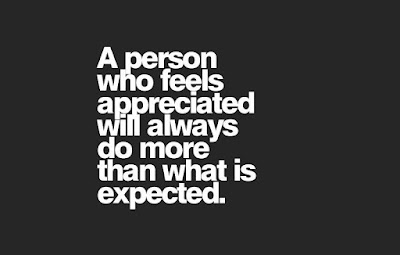Add to Learning
The Two Most Important Words a Manager can say.
There’s a lot of truth behind the saying, “People don’t leave bad jobs. They leave bad bosses.” More often than not, it’s not because they are underpaid, rather it’s because they feel undervalued and unappreciated. But what can a boss do to make employees happy? Lots of managers think that they’ve fulfilled their duty by providing a paycheck, but that’s not enough if you want engaged and productive employees.
All great bosses know that employees need to feel appreciated. Nothing works better than positive reinforcement. Research suggests you need to praise at least three times as much as you criticize to keep employees happy. Instead of being quick to criticize, be quick to point out some of the great things you see your employees doing. This will not only reinforce these positive actions with the employees that performed them but also encourage other employees to do the same.
Employee recognition methods should of course be tailored to the type of company and the personality of the employee. Special rewards are less effective if they’re just given out of habit or to the same individuals. Don’t only recognize the same top performers but also those who offer support, have improved or give their best. Every contribution from each team member matters whether small or great. You should let them know this. Appreciation coupled with incentive rewards is a great morale and productivity booster. Even the slowest employee will work to the best of their ability if they know their efforts are appreciated.
It does not cost much to show employees how much you appreciate them:
– Punish in private; praise in public. Make the public praise timely and specific.
– A personalized thank you giving specifics on how the employee has helped.
– Recognition in meetings.
–Remember to cc people’s supervisors. “Don’t tell me. Tell my boss.”
– A random breakfast or lunch.
– A relevant gift. Even something that can help them do their job better.
– Time off
Actions speak louder than words. Saying, “Thank You” can only have real meaning if employees know you are an authentic person. Be a leader who genuinely cares about employees.Other great phrases that go hand in hand with “Thank You” are:
- Great job.
- Well done.
- I’m sorry.
- How can I help you?
- What are your thoughts?
“People work for money but go the extra mile for recognition, praise and rewards.” -Dale Carnegie
It’s also important to recognize the hard work and efforts of employees even when things don’t go quite as planned. We shouldn’t automatically assume that a missed objective means that the team haven’t done their utmost best to achieve it.
Two of the most basic human desires are validation and appreciation — we need to feel like we matter. People want to feel appreciated, respected and included. The good news is that even if you invest only a small amount of time into appreciating your team, you can save yourself — and your bottom line — a lot of grief. Sometimes it’s the little things we do that counts the most. Waiting too long to appreciate employees could result in those you lead feeling resentful. Not only do underappreciated employees cost more when they (inevitably) leave but they cost a lot more if they stay. (faulty work, poor customer service, reduced productivity)
Choose to see the best in others. Choose to see what makes them amazing. Let them know the amazing things you see. Play to your team’s strengths and everyone wins.
Source Credit: Brigette Hyacinth, LinkedIn
